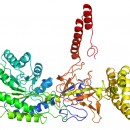| |
|
|
News: MULTICOM was ranked among top three along AlphaFold of Google's DeepMind in the 13th Critical Assessment of Techniques for Protein Structure Prediction (CASP13) according to the official assessment, 2018.
As genome sequencing is becoming a routine in biomedical research, the total number of gene and protein sequences is increasing exponentially, reaching over 100 million recently. However, to date, only a tiny portion (<0.1%) of these proteins (e.g. ~100,000) have known tertiary structures determined by experimental techniques. And the gap between protein sequence and structure will continue to enlarge as the throughput of genome sequencing techniques is much higher than protein structure determination techniques. Computational tools of predicting the structure and structural features of a protein are crucial for studying the function and structure of these proteins in order to make use of this vast repository of resources.
To meet the need, we developed a comprehensive MULTICOM toolbox consisting of a set of protein structure and structural feature prediction tools developed over the last several years, including secondary structure prediction, solvent accessibility prediction, disorder region prediction, protein domain boundary prediction, protein contact map prediction, protein disulfide bond prediction, protein beta-sheet structure prediction, protein fold recognition, multiple template combination, template-based structure modeling, protein model quality assessment, and protein mutation analysis. These tools had been rigorously tested by general users in the last several years and/or in the last seven rounds of Critical Assessment of Techniques for Protein Structure Prediction (CASP7-13) from 2006 to 2018, achieving the state-of-the-art or close performance. In order to facilitate scientific research and technology development in the field, we make the MULTICOM toolbox freely available for academic use and scientific research at this web site.
|
|
|
|

